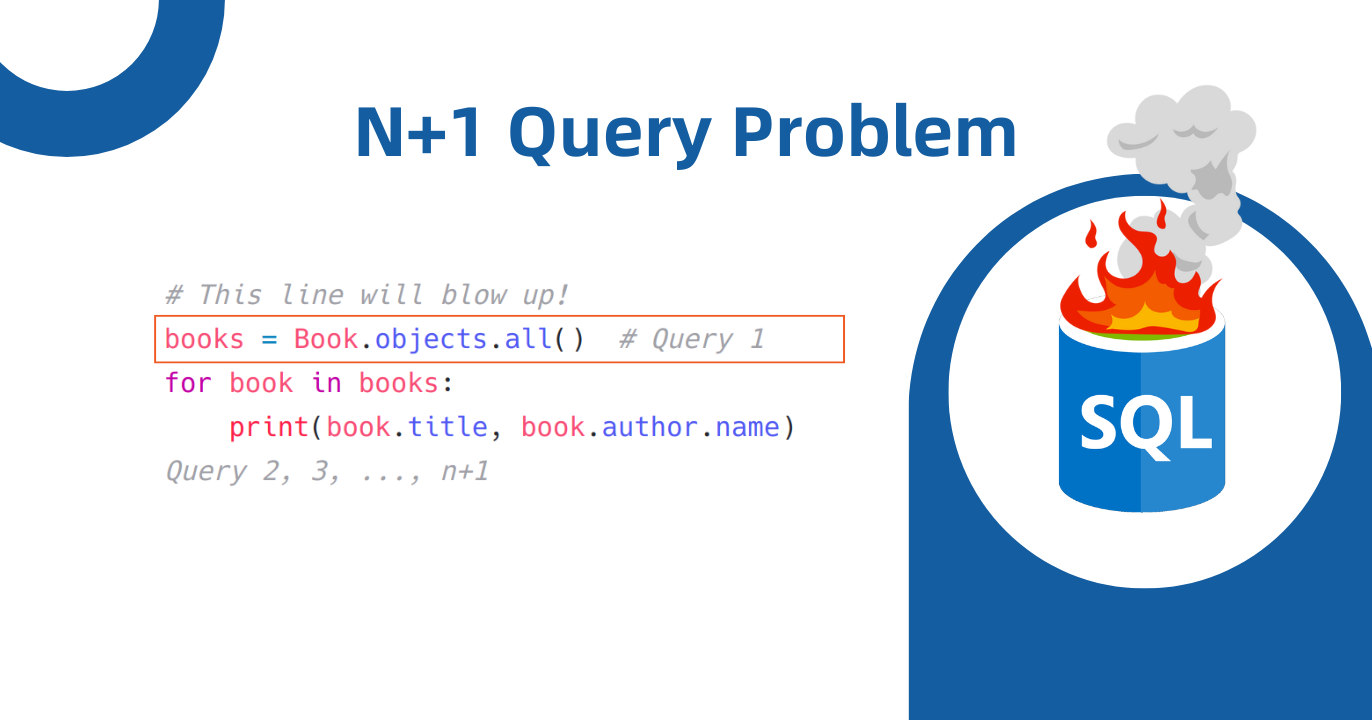Understanding the N+1 Query Problem in SQL ORMs.
Are You Experiencing Performance Issues in Your SQL ORMs? You Might Be Facing the Notorious N+1 Query Problem!”
The N+1 query problem in SQL ORMs (Object-Relational Mappings) occurs when an application needs to load a collection of related entities, but instead of retrieving all the necessary data in a single query, it executes one query to retrieve the main entities and then N additional queries to retrieve the related entities for each main entity. This results in N+1 queries, which can lead to significant performance issues due to the large number of database calls.
Explanation
The N+1 query problem happens because of inefficient fetching strategies. For instance, suppose you have a list of users and each user has a set of related profile pictures. Without optimization, the ORM might:
- Execute one query to retrieve all users.
- Execute one additional query per user to retrieve their profile pictures.
Example in Django
Let’s consider a Django model with two related entities, Author and Book:
1
2
3
4
5
6
7
8
9
# models.py
from django.db import models
class Author(models.Model):
name = models.CharField(max_length=100)
class Book(models.Model):
title = models.CharField(max_length=100)
author = models.ForeignKey(Author, related_name='books', on_delete=models.CASCADE)
N+1 Query Problem
1
2
3
4
5
6
7
8
9
# views.py
from django.shortcuts import render
from .models import Author
def author_list(request):
authors = Author.objects.all() # This is one query
for author in authors:
books = author.books.all() # This results in N additional queries
return render(request, 'authors.html', {'authors': authors})
Here, Author.objects.all() executes one query to fetch all authors, and author.books.all() executes one query per author to fetch their books, resulting in N+1 queries.
Solution
To solve this, use select_related or prefetch_related:
1
2
3
4
5
6
7
# views.py
from django.shortcuts import render
from .models import Author
def author_list(request):
authors = Author.objects.prefetch_related('books') # This optimizes the query
return render(request, 'authors.html', {'authors': authors})
prefetch_related performs a single query to fetch authors and another query to fetch all related books, thus reducing the number of queries significantly.
Example in SQLAlchemy
Consider a SQLAlchemy model with Author and Book:
1
2
3
4
5
6
7
8
9
10
11
12
13
14
15
16
17
18
19
20
# models.py
from sqlalchemy import Column, Integer, String, ForeignKey
from sqlalchemy.orm import relationship
from sqlalchemy.ext.declarative import declarative_base
Base = declarative_base()
class Author(Base):
__tablename__ = 'authors'
id = Column(Integer, primary_key=True)
name = Column(String)
class Book(Base):
__tablename__ = 'books'
id = Column(Integer, primary_key=True)
title = Column(String)
author_id = Column(Integer, ForeignKey('authors.id'))
author = relationship('Author', back_populates='books')
Author.books = relationship('Book', back_populates='author')
N+1 Query Problem
1
2
3
4
5
6
7
8
9
10
# main.py
from sqlalchemy.orm import sessionmaker
from models import Author, Book
Session = sessionmaker(bind=engine)
session = Session()
authors = session.query(Author).all() # This is one query
for author in authors:
books = author.books # This results in N additional queries
Solution
To solve this, use joinedload or subqueryload:
1
2
3
4
5
6
7
8
# main.py
from sqlalchemy.orm import sessionmaker, joinedload
from models import Author, Book
Session = sessionmaker(bind=engine)
session = Session()
authors = session.query(Author).options(joinedload(Author.books)).all() # Optimized query
joinedload fetches authors and their books in a single query using a SQL JOIN.
Occurrence in Serializers and Template Renders
In Django, the N+1 query problem can occur in serializers and template renders:
Serializers: If you serialize a queryset with related objects without using
select_relatedorprefetch_related, you might run into the N+1 query problem. For example, using Django Rest Framework (DRF) serializers can inadvertently trigger multiple queries if not optimized.Template Renders: When rendering templates that access related objects, such as iterating through authors and accessing their books, if you don’t prefetch related data, each access will trigger a new query, leading to the N+1 problem.
By using efficient fetching strategies (select_related, prefetch_related in Django and joinedload, subqueryload in SQLAlchemy), you can avoid the N+1 query problem and improve the performance of your application.
